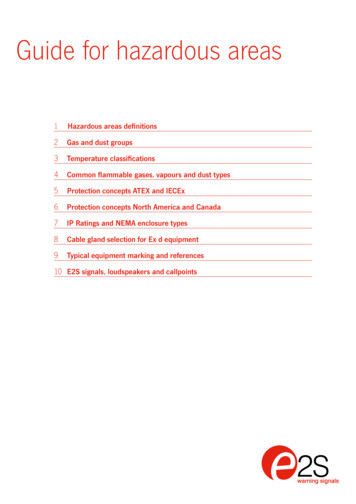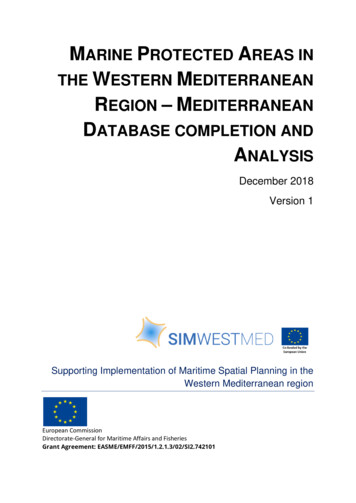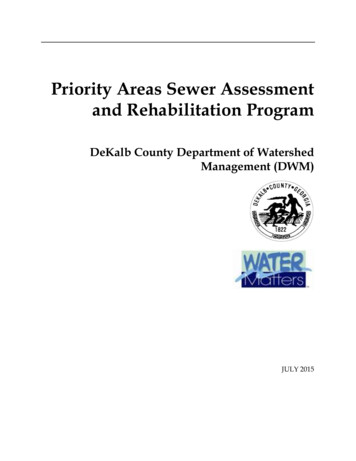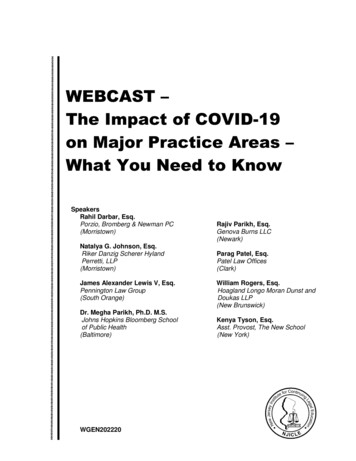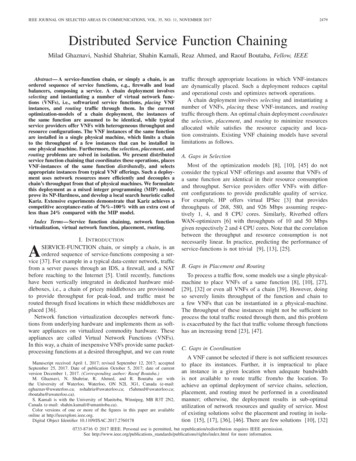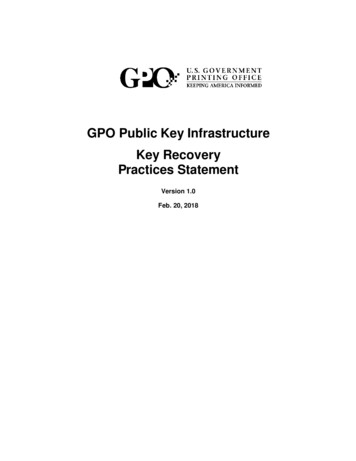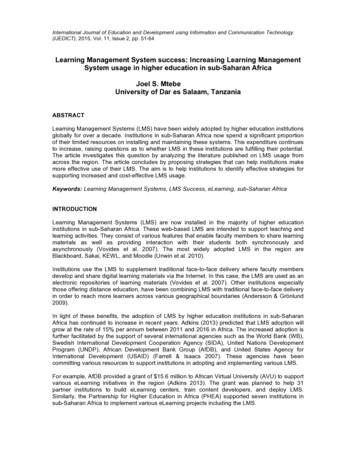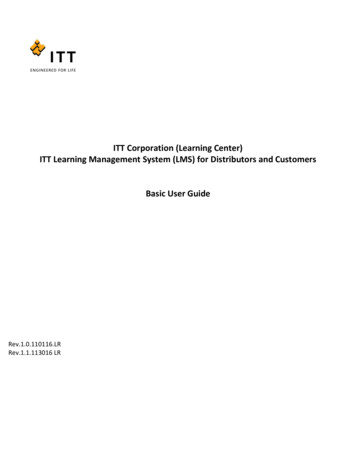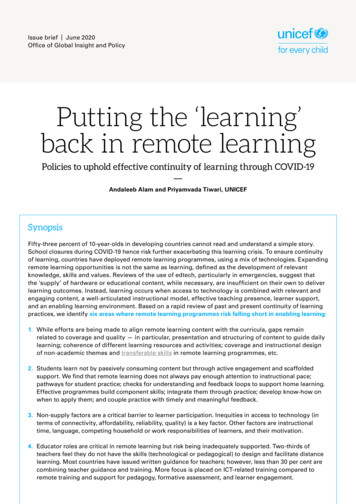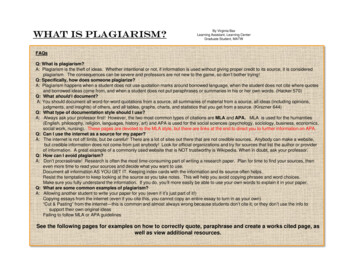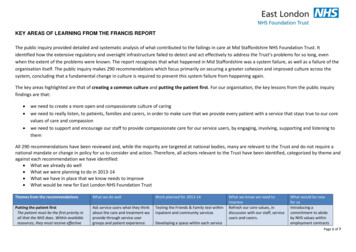
Transcription
KEY AREAS OF LEARNING FROM THE FRANCIS REPORTThe public inquiry provided detailed and systematic analysis of what contributed to the failings in care at Mid Staffordshire NHS Foundation Trust. Itidentified how the extensive regulatory and oversight infrastructure failed to detect and act effectively to address the Trust’s problems for so long, evenwhen the extent of the problems were known. The report recognises that what happened in Mid Staffordshire was a system failure, as well as a failure of theorganisation itself. The public inquiry makes 290 recommendations which focus primarily on securing a greater cohesion and improved culture across thesystem, concluding that a fundamental change in culture is required to prevent this system failure from happening again.The key areas highlighted are that of creating a common culture and putting the patient first. For our organisation, the key lessons from the public inquiryfindings are that: we need to create a more open and compassionate culture of caringwe need to really listen, to patients, families and carers, in order to make sure that we provide every patient with a service that stays true to our corevalues of care and compassionwe need to support and encourage our staff to provide compassionate care for our service users, by engaging, involving, supporting and listening tothemAll 290 recommendations have been reviewed and, while the majority are targeted at national bodies, many are relevant to the Trust and do not require anational mandate or change in policy for us to consider and action. Therefore, all actions relevant to the Trust have been identified, categorized by theme andagainst each recommendation we have identified: What we already do well What we were planning to do in 2013-14 What we have in place that we know needs to improve What would be new for East London NHS Foundation TrustThemes from the recommendationsWhat we do wellWork planned for 2013-14Putting the patient firstThe patient must be the first priority inall that the NHS does. Within availableresources, they must receive effectiveAsk service users what they thinkabout the care and treatment weprovide through service usergroups and patient experienceTesting the Friends & Family test withininpatient and community servicesDeveloping a space within each serviceWhat we know we need toimproveRefresh our core values, indiscussion with our staff, serviceusers and carers.What would be newfor usIntroducing acommitment to abideby NHS values withinemployment contractsPage 1 of 7
Themes from the recommendationsservices from caring, compassionate andcommitted staff, working within acommon culture, and they must beprotected from avoidable harm and anydeprivation of their basic rights.The core values expressed in the NHSConstitution should be given priority ofplace and the overriding value should bethat patients are put first.What we do wellWork planned for 2013-14surveys.to listen to staff about how we canimproveService user involvement inselection of some levels of staff.Trial of the Cultural barometer whenavailableService user involvement at keyTrust meetings.What we know we need toimproveExpand how we get feedbackfrom patients and staff aboutwhat they think about ourservicesWhat would be newfor usExpanding service userinvolvement in otherareas of staff selectionRecognising and celebratinggood practiceEnsuring there is patient voice atevery forum within theorganisationAll NHS staff should be required to enterinto an express commitment to abide bythe NHS valuesFundamental standards of behaviourHealth professionals should be preparedto contribute to the development of, andcomply with, standard procedures in theareas in which they workStandard operating proceduresfor some areas of practice –particularly pharmacy, CPR,safeguarding and observationIdentify key areas of practice fordevelopment of standard operatingproceduresIdentify possible ways of feeding backto staff on incident reports – possiblyby theme, through monthlynewsletters, or within the videobriefings to staffInsisting on the reporting of incidentsrelevant to patient safetyImprove some standardoperating procedures so thatthey are more consistentlyapplied in practiceSupporting staff to prioritisepatient-centred care,compassion and maintaining ourvalues over rules-based careStaff to receive feedback in relation toany report they make, including actiontaken or reasons for not actingOpenness, transparency and candourEnabling concerns and complaints to beraised freely without fear, and questionsasked to be answeredAllowing information about the truthabout performance and outcomes to beshared with staff, patients, the publicand regulatorsExecutive and non-executiveWalkRounds three times eachweek.Discussion at Trust board away-day onhow to support the development ofopenness, transparency and candourwithin the organisationListening forums led by Chair and ChiefExecutive within each directorate.Introducing patient stories at the BoardMaking the complaints processeasierShowcasing the positive impactthat complaints can haveImproving the openness ofBoard reports, includingconsidering a section on qualityconcerns raised by staffPage 2 of 7
Themes from the recommendationsAny patient harmed by the provision of ahealthcare service should be informed ofthe fact and an appropriate remedyoffered, regardless of whether acomplaint has been made or a questionasked about itEnhancement of role of GovernorsThe Council of Governors and the Boardof each FT should together consider howbest to enhance the ability of the councilto assist in maintaining compliance withits obligations and to represent thepublic interest, producing an agreeddescription of the role of governors andhow they should perform itWhat we do wellWork planned for 2013-14What we know we need toimprovePatients are generally informedof harm only when a complaint orserious incident occurs.Consider use of the Being OpenframeworkConversations with our externalpartners to support this changein cultureWhat would be newfor usProviding feedback from theExec WalkRoundsCouncil is representative of ourlocal population diversityReviewing the role of the Council ofGovernors in light of the new legislationDevelopment plan for the Councilis currently being createdInvolvement of Governors in thesystem – direct observation ofpractice, contact with patientsand familiesEnabling Governors to be ourcritical friends, by providingmore information and supportArrangements made to ensure thatgovernors are accountable to theimmediate membership and the public atlarge, with regular and constructivecontact between governors and thepublicAccountability of providers’ directorsAll directors to be fit and proper personsfor the role, and compliance to a code ofconduct for directorsProgramme of training and continueddevelopment of directorsEffective complaints handlingRecommendations from the PatientsThe Trust is required to certifyeach year that the Board has thecapabilities and capacity to fulfiltheir roles. The Board has a Codeof Conduct. The Board has aDevelopment Programme inplace, supported by an externalfacilitator.Continued Board DevelopmentProgramme, which will include relevantlearning from Francis (i.e. review ofMonitor Quality GovernanceFramework)All complaints are graded onreceipt, with high gradedInvolving the Governors in Complaintsthrough a retrospective audit reviewingCommunication fromward/team/service to BoardEmphasis on improvementA chance to review theBoard’s role andresponsibilities inrelation to qualitygovernanceRole of NominationsCommittee in relationto non-executivesWe need to improve on closingthe loop by ensuring thatPublishing informationabout complaints onPage 3 of 7
Themes from the recommendationsAssociation review into complaints atMid Staffs should be reviewed andimplementedMaking a complaint should be easy, withmultiple gateways for patients tocomment or complainLearning from comments, andencouraging feedback from service usersAdvocates and advice to be readilyavailable to all complainantsA summary of each upheld complaintshould be published on website, alongwith the Trust’s responseWhat we do wellWork planned for 2013-14complaints being highlighted andwhere appropriate referred tothe Serious Incident Gradingmeeting for consideration.responses to complaints, openness andtransparency.Ease of access – freepost,freephone, leaflet withtranslation and advocacy details.Reporting to trust board (viaIntegrated Governance Report),Patient and Carer experiencecommittee and Serious Incidentcommittee.Setting up a working party to explorehow best in involve Governors inComplaints on an ongoing basisWhat we know we need toimproverecommendations have beenimplemented.What would be newfor usour website.Improving feedback from thequarterly reports to theDirectorates on complaintswithin their services.Piloting of questionnaire tocomplainants with their final responseletter to ascertain levels of satisfaction.Senior management oversight,with response letters signed byChief ExecReports to Directorates on aquarterly basis, with breakdownby ward/CMHT.All staff subject to a complaintreceive a support packageNursingFocus on culture of caring and deliveringcompassionate care, through theselection of recruits with appropriatevalues, attitudes and behaviours,training and experience in delivery ofcompassionate care, leadership whichreinforces the values and standards ofcompassionate care, and constantsupport and incentivisation which valuesnurses and the work they doValues based selection days fornurses focusing on emotionalliteracy, compassion and the artof engagement. Service usersinvolved in every aspect of thisprocess.Nurse leadership developmentprogrammesApprentice band 6 developmentprogramme - nurturing,Revising our nursing strategy to alignwith the national vision for nursing andcare staff ‘Compassion in practice‘ andto deliver on 6 action areas to achievethe values and behaviours of the 6 C’s Care, Compassion, Competence,Communication, Courage andCommitmentMaintaining and supporting thehigh standard of new recruitsIntroduction of 360-degreeperformance appraisal for nursesPage 4 of 7
Themes from the recommendationsAnnual performance appraisal for eachnurseNurse leadership - ward nurse managersto be supervisory and not office-boundMeasuring cultural health of front-linenursing workplaces and teamsEach patient to have an allocated 'keynurse' for each shiftWhat we do wellWork planned for 2013-14developing potential and creatingcompassionate, courageousfuture leadersEnsure all nurses have access toreflective practice, clinical forums,support groups and supervisionClear job descriptions and jobplans for clinical nurse managersand matrons with clinical nursemanagers working a minimum ofthree days on the front lineAll wards to have 3 monthly half dayaway days forsupport/learning/reflectionAll patients have an allocatednurse each shiftUniform description of healthcaresupport workers, with code of conduct,education and trainingWhat we know we need toimproveWhat would be newfor usDevelop preceptorship packages forband 3 and 4 unregistered nurses,development programmes for band 3 &4, and apprenticeship for band 3 socialtherapistsIncrease access to nursing from band 3& 4 to provide clear careerdevelopment pathwayService user/family/friends feedback toform part of the appraisal processInvolving service users in testing theculture/temperature of our wards andensuring they are on any solutionfocused action groupsCaring for the elderlyConsider identifying a senior clinician incharge of each patient's careTeamwork between disciplines andservicesCommunication with and about patientsClearly identified Consultant incharge of each patient’s care,both in hospital and incommunityUsing CPA as the framework forcare provision, bringing alldisciplines and services togetherin a patient-centred approachHygieneProvision of food and drink to elderlyUsing Rio as the sole source ofclinical recordsCentralising inpatient beds, whichshould improve access to senior clinicalsupportCommunication andinformation-sharing withprimary careImproving communications with GPsTimeliness of sharinginformationSetting up a working group to look atViolence & aggression with theintention of looking at our wards andcreating safe environments for bothstaff and patients.Improving the reliability ofcommunications with patientsProviding more 1:1 time withpatients to discuss diagnosis andPage 5 of 7
Themes from the recommendationsWhat we do wellpatientsMedicines administration to be overseenby nurse in charge or nominateddelegate, with frequent checks thatpatients have received what they havebeen prescribedRecording of routine observations asthey are taken and available to all staffelectronicallyAll documents are copied topatients and other interestedpartiesDevelopment of Dementia CarePathway for Columbia ward(centralised ward that servesthree Boroughs)The appointment of a Patientparticipation lead for MHCOP inthe last few monthsHaving a Carer rep attending HCGand DMT.Work planned for 2013-14Creating dementia friendlyenvironments:Submission of application to be a pilotsite for DH project to improve theenvironment of care for people withdementia at EHCC (awaiting outcomeof stage 2 application)Dementia awareness trainingprogramme for all staff.Embed hourly rounding within patientwards CHN and adopt model forMHCOPWhat we know we need toimprovetreatmentWhat would be newfor usConsistency in the roles of wardmanagers across the servicesand allocation ofsupernumerary clinical days inEHCC wardsEnhance skills andcompetence/confidence of staffto meet the physical healthneeds of older peopleIncrease access to training forhealth care support workersEmbed 6 C’s as part of Trust NursingstrategyDevelopment of Star Wardsacross the directorate with lots ofgood initiatives.InformationElectronic records - patients to begranted access to their records andability to enter commentsSystems must be des
The report recognises that what happened in Mid Staffordshire was a system failure, as well as a failure of the organisation itself. The public inquiry makes 290 recommendations which focus primarily on securing a greater cohesion and improved culture across the system, concluding that a fundamental change in culture is required to prevent this system failure from happening again. The key .
